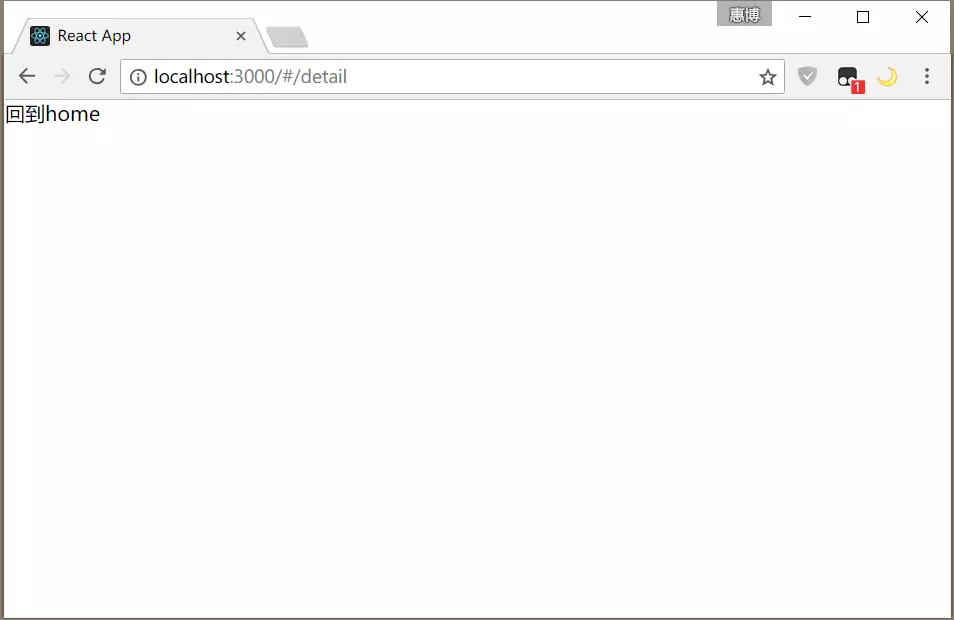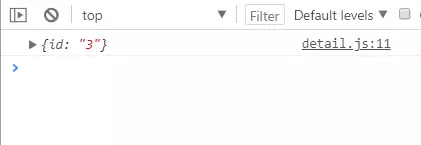安装
首先进入项目目录,使用npm安装react-router-dom
1 npm install react-router-dom --save-dev
基本操作
然后我们新建俩个页面,分别命名为“home”和“detail”。在页面中编写如下代码:
1 // home.js 2 import React from 'react'; 3 4 export default class Home extends React.Component{ 5 render(){ 6 return( 7 <div> 8 <a>去detail</a> 9 </div> 10 ) 11 } 12 }
1 // detail.js 2 import React from 'react'; 3 4 export default class Detail extends React.Component{ 5 render(){ 6 return( 7 <div> 8 <a>回到home</a> 9 </div> 10 ) 11 } 12 }
然后再新建一个路由组件,命名为“Router.js”,并编写如下代码:
1 import React from 'react'; 2 import {HashRouter, Route, Switch} from 'react-router-dom'; 3 import Home from '../home'; 4 import Detail from '../detail'; 5 6 7 const BasicRoute = () => ( 8 <HashRouter> 9 <Switch> 10 <Route exact path="/" component={Home}/> 11 <Route exact path="/detail" component={Detail}/> 12 </Switch> 13 </HashRouter> 14 ); 15 16 17 export default BasicRoute;
如上代码定义了一个纯路由组件,将俩个页面组件Home的Detail使用Router组件包裹,外面套用Switch作路由匹配,当路由组件检测到地址栏与Route的path匹配时,就会自动加载响应页面。然后在入口文件中——我这里指定的是index.js—编写如下代码:
1 import React from 'react'; 2 import ReactDOM from 'react-dom'; 3 import Router from './router/router'; 4 5 ReactDOM.render( 6 <Router/>, 7 document.getElementById('root') 8 );
这里相当于向页面返回了一个路由组件。我们运行看一下效果,在地址栏输入“http://localhost:3000/#/”:
home.js

输入“http://localhost:3000/#/detail”:
detail.js

通过a标签跳转
可以看到其实路由已经开始工作了,接下来我们再来做页面间的跳转。在home.js和detail.js中,我们修改如下代码:
1 // home.js 2 3 import React from 'react'; 4 5 6 export default class Home extends React.Component { 7 render() { 8 return ( 9 <div> 10 <a href='#/detail'>去detail</a> 11 </div> 12 ) 13 } 14 }
1 // detail.js 2 3 import React from 'react'; 4 5 6 export default class Home extends React.Component { 7 render() { 8 return ( 9 <div> 10 <a href='#/'>回到home</a> 11 </div> 12 ) 13 } 14 }
重新打包运行,在浏览器地址输入“http://localhost:3000”,试试看页面能否正常跳转。如果不能,请按步骤一步一步检查代码是否有误。以上是使用a标签的href进行页面间跳转,此外react-router-dom还提供了通过函数的方式跳转页面。
通过函数跳转
首先我们需要修改Router.js中的俩处代码:
1 ... 2 import {HashRouter, Route, Switch, hashHistory} from 'react-router-dom'; 3 ... 4 <HashRouter history={hashHistory}> 5 ...
然后在home.js中:
import React from ‘react’
1 // home.js 2 3 export default class Home extends React.Component { 4 constructor(props) { 5 super(props); 6 } 7 8 9 render() { 10 return ( 11 <div> 12 <a href='#/detail'>去detail</a> 13 <button onClick={() => this.props.history.push('detail')}>通过函数跳转</button> 14 </div> 15 ) 16 } 17 }
在a标签下面添加一个按钮并加上onClick事件,通过this.props.history.push这个函数跳到detail页面。在路由组件中加入的代码就是将history这个对象注册到组件的props中去,然后就可以在子组件中通过props调用history的push方法跳转页面。
很多场景下,我们还需要在页面跳转的同时传递参数,在react-router-dom中,同样提供了俩种方式进行传参。
url传参
在router.js中,修改如下代码:
1 ... 2 <Route exact path="/detail/:id" component={Detail}/> 3 ...
然后修改detail.js,使用this.props.match.params获取url传过来的参数:
1 ... 2 componentDidMount() { 3 console.log(this.props.match.params); 4 } 5 ...
在地址栏输入“http://localhost:3000/#/detail/3”,打开控制台:

可以看到传过去的id=3已经被获取到了。react-router-dom就是通过“/:”去匹配url传递的参数。
隐式传参
此外还可以通过push函数隐式传参。
修改home.js代码如下:
// home.js import React from 'react'; export default class Home extends React.Component { constructor(props) { super(props); } render() { return ( <div> <a href='#/detail/3'>去detail</a> <button onClick={() => this.props.history.push({ pathname: '/detail', state: { id: 3 } })}>通过函数跳转</button> </div> ) } }
在detail.js中,就可以使用this.props.history.location.state获取home传过来的参数:
1 // detail.js 2 3 componentDidMount() { 4 //console.log(this.props.match.params); 5 console.log(this.props.history.location.state); 6 }
跳转后打开控制台可以看到参数被打印:

其他函数
replace
有些场景下,重复使用push或a标签跳转会产生死循环,为了避免这种情况出现,react-router-dom提供了replace。在可能会出现死循环的地方使用replace来跳转:
1 this.props.history.replace('/detail');
goback
场景中需要返回上级页面的时候使用:
1 this.props.history.goBack();